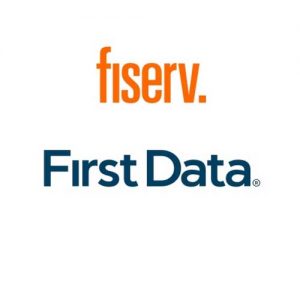Twenty-two days of talking to clients haven’t dampened Fiserv Inc.’s conviction that offering to buy First Data Corp. is the right move. In fact, if anything these conversations seem to have buoyed top executives’ confidence in the proposed $22 billion all-stock acquisition of the big processor.
“We’ve spent a substantial majority of the time [since the deal was announced Jan. 16] talking to clients, and client reactions have been incredibly positive,” Jeffery Yabuki, Fiserv’s chief executive, said Thursday. “The feedback has been probably more positive than I would have thought.”
Yabuki stood by so-called cost and revenue synergies stemming from the deal of $900 million and $500 million, respectively, which the expanded Fiserv expects to begin reaping annually five years after the merger takes effect. The merger is expected to close in the third quarter. “We’ll do everything we can to bring [the synergies] in early,” he told analysts during the Brookfield, Wis.-based company’s call to discuss the fourth-quarter and full-year results for 2018. “We expect to hit the ground running when we close.”

Indeed, with Fiserv owning multiple connections to financial institutions for services ranging from core processing to bill payment to peer-to-peer payments, an analyst questioned Yabuki about using Atlanta-based First Data’s extensive merchant network to create an on-us card-issuing and merchant-acquiring network to rival ChaseNet, the system built by JPMorgan Chase & Co. using licensed Visa Inc. software. Yabuki deflected the question but allowed that “looking at ways we can create network value for our issuer and merchant clients is high on our list.”
Other possibilities have also bubbled to the surface, he added. One, he said, is to forge real-time connectivity for banking clients from the point of sale back to their core-processing systems. “We see some intriguing opportunities around [that],” he told the analysts. “It’s still early in the process.”
On the popular subject of P2P payments, Yabuki said Fiserv signed more than 100 clients for the bank-controlled Zelle network in the fourth quarter, a number that exceeded the total of the previous three periods. All told, the company’s Zelle volume was up by a factor of six for the year, Yabuki said, without citing specifics. “We continue to see strong demand around Zelle,” he added. Total P2P transactions, including Fiserv’s proprietary Popmoney service, grew 44% last year, he added.
In other matters, Yabuki celebrated Thursday’s announcement that New York Community Bancorp Inc. had decided to convert to Fiserv for services including online banking and Zelle. The institution has assets of nearly $52 billion. “It’s the largest competitive win in our history,” he said.
In all, Fiserv posted $1.47 billion in adjusted revenue for the quarter, up 2% year-over-year, and $5.54 billion for the year, up 2.2%. Adjusted operating income totaled $492 million for the quarter, flat year-over-year, and $1.8 billion for 2018, up 1.2%.
Adjusted revenue in the payments segment of the business totaled $865 million for the quarter, a 9.2% increase, and $3.19 billion for the year, up 7.6%. Adjusted operating income came to $315 million in the quarter, a 9.4% jump, and $1.12 billion for 2018, up 8%.





